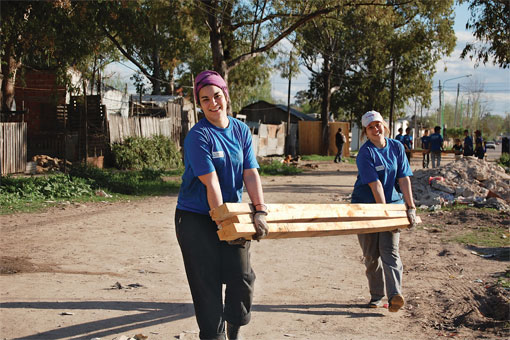September 2010 marks the bicentennial of Chile’s independence from Spain (at the hands of the liberator Bernardo O’Higgins). If the group Un Techo Para Mi País (A Roof for My Country or Techo) achieves its goal it will also mark the liberation of millions of Chile’s poor from substandard living conditions. Created over a decade ago by Jesuit priest Felipe Berríos, Techo has set the ambitious goal of eliminating all of the substandard housing in Chile’s shantytowns by 2010.
The plan? To mobilize university students throughout Chile to work together with residents of some of the country’s worst slums to improve housing. It also includes developing programs for health, education and job training and creation. “Living under a roof creates a sense of belonging to the community,” Berrios explains. “That allows residents to focus on creating a proper home by seeking education and better health conditions.”
Since it was founded in 1997 by Berríos and a small group of university students at La Universidad Católica in Santiago, the organization has built 42,000 homes, has recruited 200,000 volunteers and won the trust and participation of governments and multinational corporations throughout the hemisphere.
“We’ve gained a reputation for being well-organized and transparent in the eyes of governments and private companies, but also among the general population,” says Ignacio González, the group’s U.S. director for development and a former volunteer builder.
In 2001, the organization moved beyond Chile to open offices in Lima and San Salvador. Today, it operates in 15 Latin American countries.
Most of the volunteers are under 30, which Berríos credits for much of the organization’s driving energy and its transnational appeal. The young, often privileged volunteers that work side-by-side with marginalized populations “have stopped talking about ‘this country’ and have started talking about ‘my country’,” Berríos says. “They want to be protagonists of a better future.”
Techo has expanded its ambitious goal to eradicate substandard housing in all of Latin America. Plans are underway to build another 20,000 houses, and add another 50,000 volunteers throughout the region by the end of the year, where an estimated 15 million citizens live in substandard housing—or don’t have homes at all.
In 2007, President Michelle Bachelet awarded the organization Chile’s Bicentenary Seal; and in 2008 the Peruvian Congress gave it special recognition for its assistance after an earthquake devastated much of the central coast region in August 2007.
Berríos credits the organization’s success and energy to the unique combination of the students who donate their time to effort and the beneficiaries they live and work with.
Recently, just after volunteers finished work on a new home in Curanilahue, 316 miles (509 kilometers) south of Santiago, Chile, the new owner rushed up to say thanks.
“This is the first time I won’t have to order my children to climb on their beds when it rains,” the woman, a mother of five, told the builders. “So they don’t get covered in mud.”





